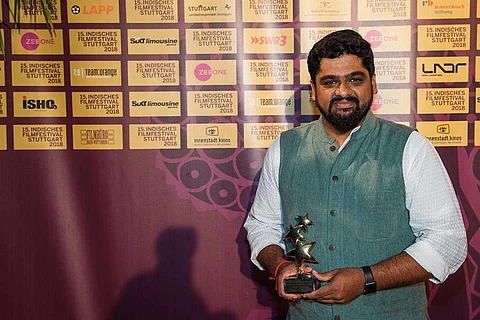

At the time it had seemed like a statement any aspiring filmmaker would make. He had made a few short films. A documentary and a music video too. Director Rahul Riji Nair had then - at the fag end of 2016 - said he had plans to make a feature film soon.
A year later, his first feature, Ottamuri Velicham, won the Kerala State Award for Best Film. One more year later, his new movie, Dakini, is in theatres.
Dakini is a world away from what Ottamuri had been. “Ottamuri Velicham was a slow-paced realistic thriller. Dakini, I knew, should stand apart, on its own,” Rahul tells TNM.
A year later, Ottamuri continues to win accolades. It has now been shortlisted for the Oxfam Best Film on Gender Equality Award 2018 at the Jio MAMI 20th Mumbai Film Festival.
“I wouldn’t call it an art house film. It is just that the settings and the premise were all too minimal,” Rahul says.
The film has just a few actors, all of them just a few films old, except Pauly Wilson, a veteran who also won a state award for her performance. She plays a helpless mother-in-law to a young woman who moves to a remote village with her new husband, a man with a permanent scowl on his face, indifferent to the core. The film depicts the steps it takes for a new marriage to turn into a world of horror and abuse.
Ottamuri Velicham
Not that Rahul has seen anything like it. Ottamuri Velicham is to him more of a personal revolt, the ending of a long struggle. “Like any average film aspirant, I have struggled for years with the dream of making one. Several times, I would be on the brim of making a film, but somehow it would get cancelled. It reached a point where I thought enough was enough, let me do something with whatever resources I have. I knew the film was not going to collect much from theatres. That it is going to be one that went to international festivals and watched by a serious audience.”
But it did what six to seven years of struggle did not. It gave him confidence, and opportunity to make another film. Dakini happened. You cannot identify the director of Ottamuri behind the camera, if you look for a familiar touch. Here are four elderly women taking charge, leading the show, a rarity in Malayalam cinema. It is no sob story, as stories of senior people often end up being shown. It is fun and entertainment, it is heroism by four overly smart grandmas!
“I had the backing of Universal Cinemas and Urvasi Theatres for production, and Friday Film House for distribution. I knew I wanted to make a comic book cinema, one that couldn’t be enjoyed through logic. It is in this way that Dakini is the opposite of my first film. That was realism, this was caricaturish,” Rahul says.
Dakini
But you can find a similar formula in both films if you dig deep. Rahul says that in Ottamuri, he wanted to make light his villain. “Light is always connected to a positive sense – light at the end of the tunnel, we say. What if light becomes a villain, that was my first thought. So in the film, light affects a girl’s privacy, happiness, peace.”
In Dakini, he uses a similar philosophy of turning the hero into villain. Dakini is known to Malayalis as an evil comic character. In the same comic, the hero is called Mayavi. In the film, however, Dakini – in fact, a team of four Dakinis – becomes the hero and the villain is aptly named ‘Mayan’.
Not that Rahul had shied away from the hero-centric film that new filmmakers dream about. He had an idea for one, it just didn’t take off. Perhaps it was fortunate for him, on hindsight. That’s what made him work on Ottamuri,which brought him a recognition that perhaps a hero-centric film might not have. And even after that, he didn’t try to launch himself into commercial mainstream cinema with a macho movie. He chose four senior women to be his heroes and watched with admiration the passion and commitment they showed.
His next? He can’t talk about it yet.